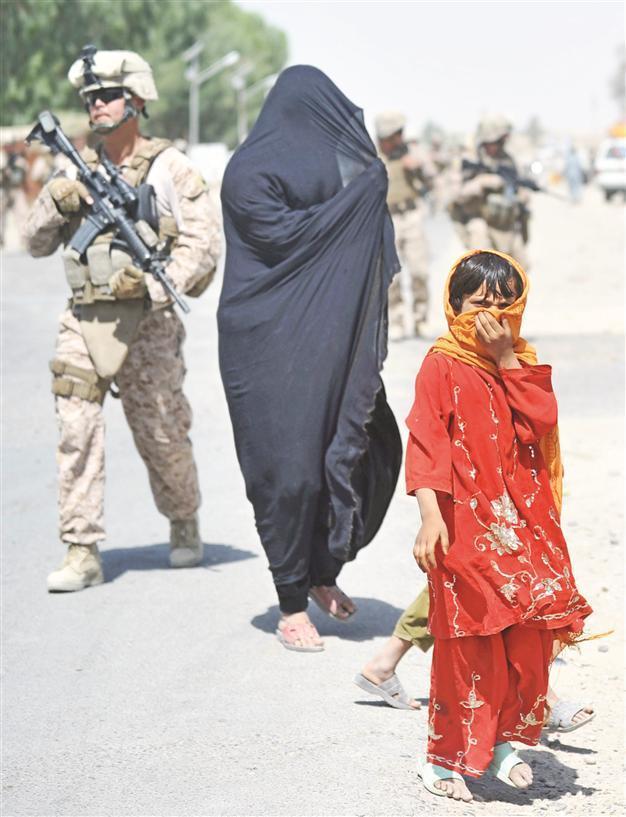Afghans to recruit spies to prevent insider attacks
KABUL

US soldiers conducts a patrol as Afghan civilians walk in the street in Garmser, Helmand Province in Afghanistan. In the past 10 days, Afghan forces have attacked their coalition partners seven times. This year 40 soldiers have died from insider attacks. AFP photo
Afghan officials have launched a new effort to gather intelligence about their own police and army recruits following a recent spike in insider attacks, also known as “green-on-blue attacks,” in order to reduce the number of deaths among foreign troops in Afghanistan.In the past 10 days, Afghan forces have attacked their coalition partners seven times, killing nine Americans. This year there have been 32 such incidents, in which 40 have died, compared with 21 attacks, in which 35 were killed, in all of 2011.
Taliban supreme leader Mullah Mohammad Omar last week said the insider killings were the result of an insurgent campaign of infiltration, though NATO has said it’s too early to tell if the attacks were related to the insurgency of caused by personal disputes turned deadly.
Measures the Afghan government is taking to reduce the incidence of such attacks include the deployment of dozens of undercover intelligence officers in Afghan security units nationwide,
increased surveillance of phone calls between Afghan troops and their families, and a ban on cell phone use among new recruits, so they will have fewer opportunities to contact members of the insurgency, Afghan officials said, according to the Washington Post.
“Soldiers must feel that they are under the full surveillance of their leadership at all levels,” the Afghan Army’s chief of staff, Gen. Sher Mohammad Karimi, said in an interview after meeting with the chairman of the U.S. Joint Chiefs of Staff, Army Gen. Martin Dempsey, and other U.S. commanders.
“Initially, it will have a negative impact on morale, but we have to do something. We have to look seriously at every individual.”
NATO’s steps
President Barack Obama said Aug. 20 the U.S. needed to do more to safeguard its troops after a spate of Afghan “insider” attacks. “We’ve been watching with deep concern these so-called ‘green-on-blue’ attacks, where you have Afghan individuals, some of whom are actually enrolled in the Afghan military ... attacking coalition forces,” Reuters quoted Obama as saying.
Still, Obama declared his intention to stick to his war strategy, using U.S. troops to advise and mentor Afghan forces.
The best approach, he said, with the fewest deaths in the long run, will be to maintain the plan for shifting security responsibilities to the Afghans. “We are transitioning to Afghan security, and for us to train them effectively [our troops] are in much closer contact … with Afghan troops on an ongoing basis,” Obama said.
NATO has taken steps in recent days to try to limit the attacks. Across Afghanistan, service members have been asked to keep their weapons loaded at all times, according to coalition officials.
NATO has also activated an existing program, dubbed “Guardian Angels,” in which coalition troops whose only job is to watch their fellow troops attend meetings with Afghan officials are prepared to quell an insider attack if one should occur, the Post reported. Afghan officials say 176 intelligence officers were assigned to army battalions last week and most will remain undercover. They join hundreds of others who are tasked with spotting wayward troops before they carry out “green-on-blue” attacks.
Attack on top commander’s plane
“Whenever a new recruit goes on leave, we have reconnaissance following that person to make sure he doesn’t pose a threat,” said Abdul Hamid. Meanwhile, militants fired rockets into a U.S. base in Afghanistan and damaged Gen. Dempsey’s while he was there on a visit, but the general was not near the aircraft, a spokesman for the U.S.-led military coalition said yesterday.
Two maintenance workers were slightly injured by shrapnel from the two rockets that were fired into Bagram Air Field outside Kabul on the night of Aug. 20, coalition spokesman Jamie Graybeal said. Dempsey “was nowhere near” the plane when the rockets struck near where the aircraft was parked, Graybeal said. Taliban spokesman Zabiullah Mujahid claimed responsibility for the attack.
















